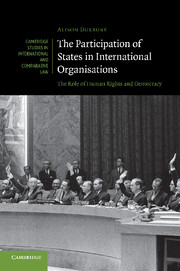Book contents
- Frontmatter
- Contents
- Foreword
- Acknowledgements
- Table of cases
- Table of treaties
- List of abbreviations
- Introduction
- 1 The move to institutions in the age of rights
- 2 The challenge of universality – the League of Nations and the United Nations
- 3 Rights, regionalism and participation in Europe
- 4 Restricting the ranks – excluding states from closed organisations
- 5 The relationship between powers, purposes and participation in specialised organisations
- 6 Legitimacy, democracy and membership
- Conclusion
- Select bibliography
- Index
- CAMBRIDGE STUDIES IN INTERNATIONAL AND COMPARATIVE LAW
- References
2 - The challenge of universality – the League of Nations and the United Nations
Published online by Cambridge University Press: 01 March 2011
- Frontmatter
- Contents
- Foreword
- Acknowledgements
- Table of cases
- Table of treaties
- List of abbreviations
- Introduction
- 1 The move to institutions in the age of rights
- 2 The challenge of universality – the League of Nations and the United Nations
- 3 Rights, regionalism and participation in Europe
- 4 Restricting the ranks – excluding states from closed organisations
- 5 The relationship between powers, purposes and participation in specialised organisations
- 6 Legitimacy, democracy and membership
- Conclusion
- Select bibliography
- Index
- CAMBRIDGE STUDIES IN INTERNATIONAL AND COMPARATIVE LAW
- References
Summary
Peace, democracy and universality
Given the experience of the previous five years and the events that were to unfold in the next two decades, perhaps the most melancholy words in international law are located in the preamble to the Covenant of the League of Nations adopted in 1919 at the Paris Peace Conference. Like the UN, the aim behind the creation of the League was to ‘promote international co-operation and to achieve international peace and security’. This was to be realised through the establishment of an organisation that would facilitate ‘open, just and honourable relations between nations’ and enable states to settle their disputes without recourse to war. The main players at both Versailles and at the San Francisco Conference were the Great Powers (differently composed) and their attitude towards the way in which a world organisation should be constructed varied between a belief that all (or at least most) states in the international community should be admitted and the conviction that conditions needed to be prescribed in the founding document. Both approaches were grounded in the belief that either an expansive or a restricted membership would be the best method of ensuring that each organisation could fulfil its primary function – the preservation of peace.
- Type
- Chapter
- Information
- The Participation of States in International OrganisationsThe Role of Human Rights and Democracy, pp. 60 - 123Publisher: Cambridge University PressPrint publication year: 2011



